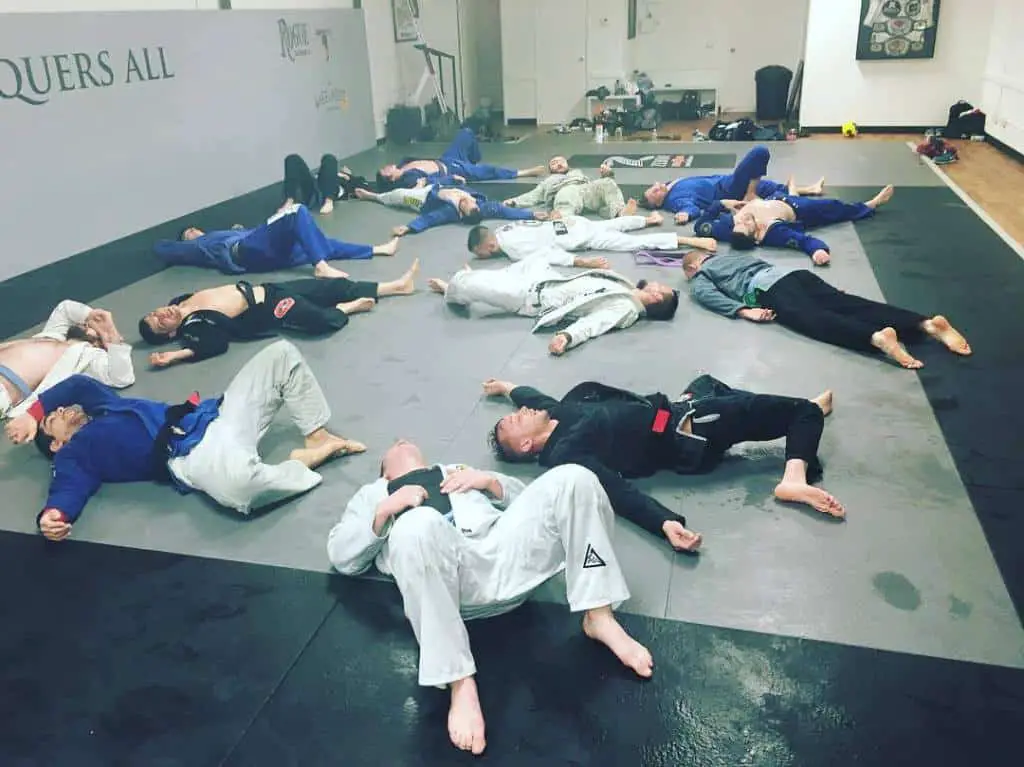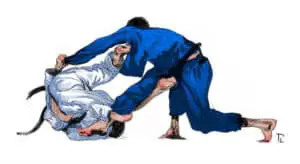
Even if you have all the BJJ technique in the world if you don’t have sufficient conditioning to showcase your skills you will never be a high-level Jiu Jitsu practitioner. One popular method BJJ athletes use to build their cardio is running but is it effective?
Will Running Help My Jiu Jitsu?
Running will improve your Jiu Jitsu conditioning which can improve your on mat performance. However, it is not an effective method to develop cardio. BJJ athletes are better off sparring hard and performing intense BJJ drills to develop specific Jiu Jitsu cardio.
BJJ is just too different from running that the cardio transfer is minimal. BJJ is an all-over body workout where your muscles are constantly squeezing. You are pushing, pulling, and grabbing your opponent this heavily engages your back, neck, shoulders, and arms. These muscles are not developed at all during running. Running is almost a pure leg workout and does not adequately condition your muscles for the demands of BJJ.
Another big issue with running is you typically set your own pace and run at a pace that is manageable for you. In a sport like BJJ you don’t have this luxury. During BJJ you are forced to react to your opponent’s movements whether you can maintain the pace or not.
It doesn’t matter how tired you are if your opponent decides to turn up the heat and chain together passes you can’t just keep jogging along you need to match their intensity and stay one step ahead. Running does not build this reactive cardio that is so important in BJJ.
Running is also not well suited to mimicking the stop-start motion of BJJ. Going on a steady-state jog is largely useless for developing Jiu Jitsu cardio as BJJ is made up of many periods of stopping and starting. To train your body for this specific demand you need to practice it and jogging is just not going to help you.
If you are going to use running to help out your Jiu Jitsu conditioning you should perform sprints to build explosiveness, intermittent sprinting to practice the stop-start pace of BJJ, and reaction drills to develop the ability to respond to your opponent’s movements.
If BJJ athletes want to sprint I would recommend they train them once a week and focus on distances 30 yards and below. With a focus on 10 and 20 yards. When training speed you need to sprint at 100% speed and need to take extended breaks between each sprint. This is to develop maximal explsoiveness when you are shooting a takedown, performing a guard pass, or bridging.
Intermittent sprinting and reaction drills can also be performed once a week but on a separate day to your pure speed sprinting day. An example of intermittent sprinting would be jogging 100m then sprinting 20m and performing 5 reps of this without stopping.
For reaction drills, you need a partner to call out signals. You can start jogging and when he calls out a signal you can start sprinting. To build different skills you sprint backward, change directions, and run horizontally.
Running may be good for sports like soccer, football, and rugby which actually involve substantial running but for BJJ there are far better methods to develop cardio.
What Is The Best Way To Build BJJ Cardio?
Specific BJJ training is the best way to develop your BJJ cardio. You can either increase your training volume by increasing your session length or by adding in another practice per week. You can also increase your training intensity, instead of sparring at 70%, you can spar at 80%.
BJJ is a unique sport and the best way to condition your body for its unique demands is to train harder and more often. The vast majority of BJJ athletes are going to experience the best cardio gains by simply ramping up their BJJ training. They don’t need to worry about running, swimming, or Crossfit, just sparring a couple of extra rounds per week will cause their cardio to shoot through the roof.
If you are a BJJ practitioner who feels like they need a cardio boost the first step is to prolong your existing training. If you are going to the gym 3 times a week, try going 4 times a week and watch how your work capacity increases.
If you can’t squeeze an extra BJJ training session in try extending your current practice length. If you are training for 1 hour each session stick around for an extra 15 minutes, get in some extra reps and another round of sparring.
Your other option if you want to develop your BJJ conditioning is to increase the intensity of your training. This means instead of training more hours you simply do more in your current training time.
For example, let’s say during your typical training you get in 100 reps when drilling at your next training session speed it up, and pump out 120 reps. If you usually do 4 rounds of sparring and take 2 rounds off, next time do 5 rounds and only sit out 1 round.
Also when you are sparring you can increase your work-rate, fight harder to prevent having your guard passed, attack more submissions, move more, create scrambles. If you increase your BJJ training intensity you will spend a longer time with an elevated heart rate which will cause your cardio to soar.
